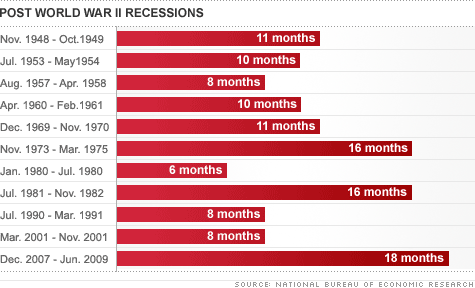
uncertain about the future.
The National Bureau of Economic Research, an independent group of economists, released a statement Monday saying economic data now clearly point to the economy turning higher last summer. That makes the 18-month recession that started in December 2007 the longest and deepest downturn for the U.S. economy since the Great Depression.
NEW YORK (CNNMoney.com) -- The Great Recession ended in June 2009, according to the body charged with dating when economic downturns begin and end.
But the news is little comfort to the millions of Americans still out of work, underwater on their mortgages or
Still, weaker economic data over the past few months have led to rising fears of a double-dip recession. The forecast of top economists surveyed recently by CNNMoney was that there is a 25% risk of a
In its statement, the NBER acknowledged the risk, but said "the committee decided that any future downturn of the economy would be a new recession and not a continuation of the recession that began in December 2007."
The NBER said it "did not conclude that economic conditions since that month have been favorable or that the economy has returned to operating at normal capacity." Rather, it decided that June was when the economy hit bottom, and that it has been slowly but steadily growing since then.
"Economic activity is typically below normal in the early stages of an expansion, and it sometimes remains so well into the expansion," said the NBER.
"Obviously, for the millions of people who are still out of work, people who have seen their home values decline, people who are struggling to pay the bills day to day, [the recession is] still very real for them," he said.
Most economists have been saying for months that the recession likely ended in the summer of 2009.
"No, we are not still in a recession as some people have asserted," said Barry Ritholtz, CEO of Fusion IQ, a research firm based in New York. "No, it's not a depression. The wheel has turned, the trough is more than a year behind us. This is not a robust recovery, but the economy is now expanding, not contracting."
Ritholtz places the risk of a double-dip recession in the 20%-30% range. Some other economists have put the risk as high as 40%. One of those is Sung Won Sohn, economics professor at Cal State University Channel Islands. He said the NBER determination does nothing to reduce his fears of another recession looming around the corner.
"The primary reason is we don't have any cylinder powering the economy," he said. "It's hard to imagine where the strength comes from."
The NBER typically takes a long time to declare the start and end of recessions, waiting for all the economic data to be revised and finalized and making sure that any change in direction of the economy is long-lasting. It didn't declare that the recession started in December of 2007 until a year later.
0:00 /1:55Economists: Politics holding up economy
In addition to looking at gross domestic product, the broadest measure of the nation's economic health, the NBER also weighs employment, industrial production, income and sales for determining when the economy changes direction.
Gross domestic product has recovered to about 70% of its pre-recession level, said Lakshman Achuthan, managing director of Economic Cycle Research Institute and an expert in the dating of recessions. Other measures followed by economists, such as industrial production and sales, have also rebounded nicely, he said.
But he acknowledged that the rebound hasn't felt like a recovery to the typical American. He pointed to private sector employment -- only 9% of jobs lost during the recession have come back -- as an area of continued weakness.
That, and several other weakening indicators, are key factors in rising fears of a double dip.
Double-dip recessions are still relatively rare. The last one occurred in the United States when the 1980 recession was followed by another in 1981-82. The NBER waited until July 1981 to declare the end of the 1980 recession, which turned out to be the same month that it eventually determined the next recession had begun.
Speaking to a town hall meeting in Washington, President Obama said the announcement about the end of the recession is further proof that steps taken early in his administration, including the economic stimulus package, were the right ones. But he cautioned it does not mean that the economy has recovered.within the next year, up from a 15% chance just six months ago.The housing recession isn't over

No comments:
Post a Comment